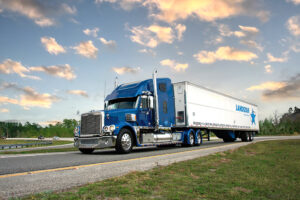During the closing banquet for Truckload 2023: Orlando, Dave Williams officially picked up the reins as chairman of the board for the Truckload Carriers Association (TCA). Williams first entered the trucking industry in college, landing a job in the shop at what was then Knight Transportation. Now, 31 years later, he serves as senior vice president of equipment and government relations for the same carrier, now known as Knight-Swift Transportation. An active member of the TCA for nearly a decade, Williams says he’s excited about the momentum the association is gaining on Capitol Hill and the value it provides to its members. As he accepted the role of chairman on March 7, Williams clearly outlined his goals for TCA as well as the trucking industry as a whole. During this first visit with Williams, the Truckload Authority team quickly discovered that Williams is intently focused on the issues faced by the trucking industry; in addition, he is dedicated to providing value to TCA’s members. Here, he shares his passion for the industry, along with a few of his goals for the coming year.
Congratulations on picking up the reins as the chairman of the Truckload Carriers Association. What does this step mean to you, both personally and professionally?
Serving as TCA Chairman is a tremendous responsibility. I feel strongly that each of us has an obligation to give back to the industry, and this is one of my opportunities. Fortunately for me, the TCA staff and the officers group are very strong and won’t let me get too far off track.
What do you see as the most important issue facing the industry today?
Truckload is such a wonderful and essential industry. But let’s be honest, it’s not for everyone … it’s a tough industry. It requires a tremendous amount of capital risk, with financial rewards that often don’t coincide with the amount of risk that is taken. That is a problem.
I believe that one of our big issues is being able to spend less time locked into survival mode and spend more time understanding the driving factors that make it difficult to succeed in our industry. We should be spending more time asking ourselves what we want this industry to look like in five, 10, or 20 years. We have potentially transformational technologies and regulations that we are going to face over the next couple of years. We really need to make sure we are thinking clearly about our place in the economy and make sure that it works for us.
TCA’s annual convention, Truckload 2023: Orlando, wrapped up just a few weeks ago. How would you describe this year’s event?
It was a tremendous success! We have received a lot of positive feedback, and we are so grateful for all that attended. Special thanks to those who helped in any way.
It takes an army of volunteers to pull off a good conference. Thank you all. We have really gone to great lengths in recent years to build fresh energy back into the convention by adding new elements, staying relevant with topics, bringing in high-quality learning opportunities, and listening to the feedback from our fleet and allied members. This is an evolutionary process where we hope to adapt to current needs and create a valuable experience for all. Our plan is to build on this year’s success and make it even better next year … no pressure right?!
During your acceptance speech at the closing banquet at Truckload 2023: Orlando, you touched on the main points of your goals for the trucking industry and for TCA. Please explain those for the membership.
Throughout much of my career, I would describe our industry as fairly reactive, and a bit resistant to change. When proposals for change came our way, our immediate response was more than likely to fight against them. This is not necessarily a bad thing, considering that many of the proposals weren’t that good!
As we fast forward to today, the proposals are coming at us at light speed. We find ourselves under attack from every angle, and we need a new strategy. As part of that new strategy, we have an opportunity to reclaim the narrative and set our own agenda. An industry that ‘proactively polices’ itself can more effectively take the high ground and defend against well-intentioned, but misguided, proposals from outside groups. The key is being forward thinking and rallying around initiatives that will ultimately put the industry in a better position.
In my remarks, I recommended creating initiatives around four areas:
- Improving the driving job.
- Improving safety.
- Improving the financial sustainability of trucking companies.
- Improving our tangible impact on air and water quality.
I don’t think anyone in the industry wants bad jobs, more accidents, bankruptcies, or dirty air. These are all things we can agree on…no brainers. I proposed that it’s time to do something about it. We would then ask government agencies to support our goals rather than the other way around.
We change the narrative. It starts with defining what we can do in each of those areas to really make an impact. Over the next few months, we are going to begin outlining how we go about getting some of these things done. I am excited and anxious to do this and would invite all who want to play a role in this process to let your voice be heard.
What events and projects are on your calendar for the next three months?
My other job with Knight-Swift Transportation is keeping me plenty busy, as we just announced our plan to acquire U.S. Xpress. Outside of that, I plan to spend a significant amount of time working with TCA members and staff on our issues in Washington, D.C. We have started putting together monthly visits for TCA members on Capitol Hill for those who are interested. I would recommend them to everyone, beginners and experts alike. These visits are not only critical in educating policy makers, but they also help TCA members realize how effective their voice can be in shaping policy.
I also plan to attend the Safety and Security meetings in San Antonio in June, and the Refrigerated Meeting in July in Park City. No rest for the weary.
As the incoming chairman, what message would you like to share with TCA members who are not actively involved in the association’s educational programs, legislation reform efforts, and other opportunities?
For me, getting involved early in my career has been a great blessing. I feel like I have been able to make better decisions on behalf of my company as my understanding of the issues has improved. Behind every regulatory or legislative policy is a business issue or practice. I have worked hard to really dig in and understand how some of these proposed policies will impact our businesses. While I still have a lot to learn, I feel like I have been able to make more balanced decisions that stand the test of scrutiny and time.
So, I would encourage members to commit to making the critical investments of time and involvement. The more you invest, the greater the returns within your own business. There is a tremendous amount of value that can be unlocked as a TCA member. If you are unsure how to start, please reach out and let us make a few suggestions.
As many in the industry would agree, there is a shortage of company drivers. In your opinion, how can carriers work to attract and retain qualified drivers?
One of the things you will find about me is that I was trained by my mentor, Kevin Knight, to think a little differently. I don’t like the word “shortage.” I have been hearing about the driver “shortage” since I started in the industry in 1992, and it was talked about for at least 10 years prior to that (a total of over 40 years).
The law of supply and demand would say that if there is a shortage of something that is in strong demand, the price (driver wages) for that resource goes up until supply and demand are balanced. Until recently, driver wages have generally increased in line with, or even below, inflation. And even more recently, driver wages have stopped rising. If there is a shortage, why would driver wages not continue to increase? Because supply and demand have reached balance.
There is something else going on here that we need to look at from a different angle. Part of that discussion involves addressing the pain points that make the driving job less competitive than other options that workers may have. Another part of that discussion involves acknowledging the peaks and valleys of truckload cycles and understanding that demand for drivers is not constant. That will take longer than we have room for in this chat.
Earlier this year, TCA joined a group of industry stakeholders to form the Clean Freight Coalition. What is the group’s ultimate goal, and how can TCA members get involved in the efforts?
The Clean Freight Coalition is important because it combines the voices of several large trucking stakeholders in the national debate on energy and climate change. Like it or not, this issue is not going away. Our goal is to help policymakers understand the industry’s strong track record of collaboration in achieving meaningful emissions reductions over the years.
We also want to make sure that the transition to a zero or near zero-emissions future is done the right way and doesn’t jeopardize the nation’s supply chain. Recent proposals from policy makers have been far from collaborative.
This is a critical time for the industry to ramp up the dialogue on some of the technical challenges associated with zero emissions tractors that we have not been able to solve. This is not about a reluctance to adopt technology, it’s about timing. Much of the proposed technology has not matured enough to be effectively commercialized. Even if we resolve some of the operational issues associated with the weight, range, and cost of the tractors, we still have significant infrastructure issues that loom over us.
Rather than trying to take the massive leap to zero-emissions, I think we would be much more successful by implementing intermediate targets and working in stages towards zero-emissions. The current proposals put us on a path where the threat of the industry spending massive amounts of money, and then realizing that we need to backtrack and readjust our national strategy, is very real. That would be a disaster.
In recent years numerous types of safety technology, from automated driver-assistance systems (ADAS) to forward- and driver-facing cameras, rear underride guards, and more have been integrated into most fleets. In your experience, what impact have these measures had on the overall safety of the trucking industry?
For most of my career, the safety technology options available on our tractors and trailers were slow to develop, and the choices were few and far between. In the past decade, the number of legitimate options has exploded. This is a huge win for safety, as many of these options improve our drivers’ ability to avoid or minimize the severity of accidents. While driver training will continue to play an important role, many fleets have turned to these emerging technologies to “engineer” accidents out of the system.
It is critical that as an industry we do a good job of training our drivers how to interact with these technologies rather than assuming that the technologies will work on their own. Going back to our discussion about our industry being more proactive, this technology will play a critical role in helping us reach the next level of safe operations.
We’ve heard talk of eliminating the federal excise tax (FET) in recent months. If the proposed legislation is passed, what kind of effect will it have on the freight industry as a whole, and on trucking specifically?
Federal excise tax was first implemented 100 years ago to help the country pay for World War I. It’s funny how some things start for one reason and then never go away. I think this issue has really come to the forefront as new emissions technologies have seen their already-astronomical costs compounded even further by FET, adding $40,000+ to the cost of some of these zero-emissions tractors. The tax has become a financial obstacle in deploying some safety technologies as well. In addition, the tax is too concentrated on buyers of new equipment, while the benefits of the tax go to all road users via the Highway Trust Fund. By removing the tax, we really hope to create momentum for investing in safety technologies and other emissions reducing technologies as those technologies mature. It’s the right thing to do.
Finally, as you assume the chairmanship, what excites you most about the year ahead?
I really feel like the truckload industry is approaching a fork in the road. We have some big decisions to make. I am really excited about facilitating healthy discussions within the TCA membership on how we should approach our future.
Finding the right balance between learning from the past and adapting to the future is tricky. We can’t underestimate the need to leverage the hard-earned lessons from the past that have brought great success to our industry. At the same time, if we aren’t willing to adapt, we run the risk of becoming the next Blockbuster Video, MySpace, or travel agency industry. While fashion trends eventually come back in style, business models usually don’t.
I have a tremendous amount of confidence in our industry. We are survivors, and together, we will succeed.
Thank you, Mr. Chairman, for your time. We look forward to an exciting year!
This article originally appeared in the May/June 2023 edition of Truckload Authority, the official publication of the Truckload Carriers Association.
Linda Garner-Bunch has been with The Trucker since 2020, picking up the reins as managing editor in 2022. Linda has nearly 40 years of experience in the publishing industry, covering topics from the trucking and automotive industry to employment, real estate, home decor, crafts, cooking, weddings, high school sports — you name it, she’s written about it. She is also an experienced photographer, designer and copy editor who has a heartfelt love for the trucking industry, from the driver’s seat to the C-suite.











